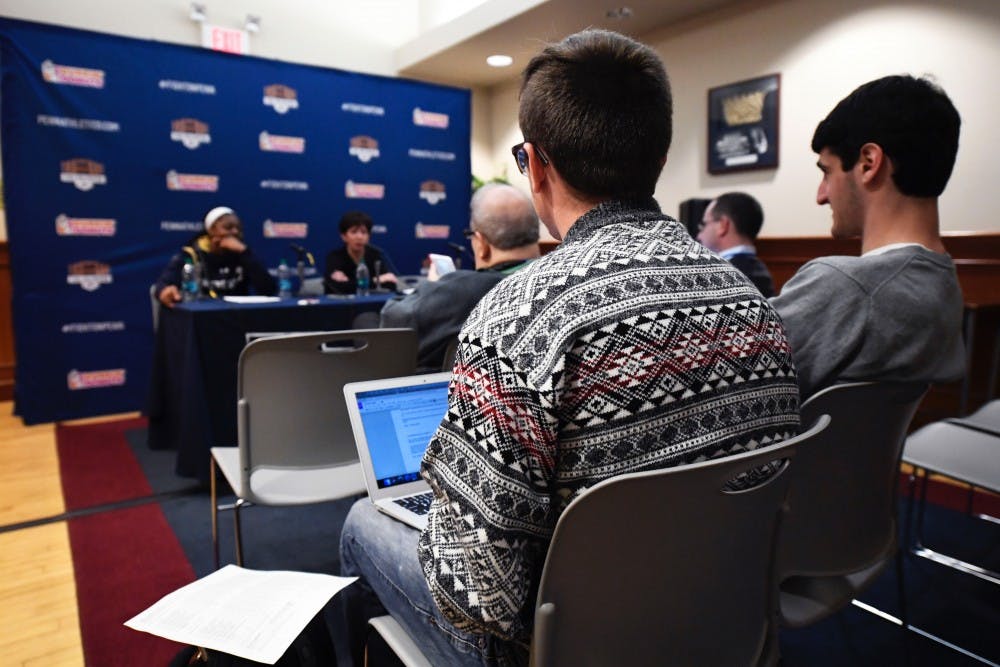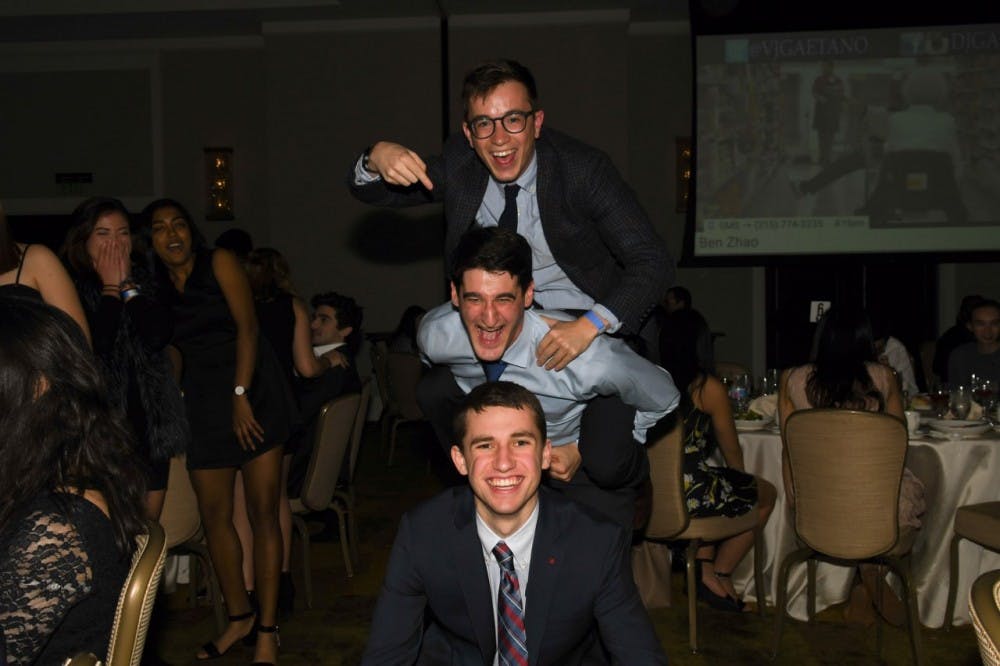
I can’t remember the exact moment I realized I didn’t belong at Penn.
Maybe it was when I read The New York Times exposé on the economic inequality at America’s top schools.
It revealed that Penn has more students in the top 1% of the United States income bracket than the bottom 60%. Almost three-quarters of students come from rich families in the top 20% in terms of income. The statistics gave voice to a million smaller, silent moments: downtown tickets haphazardly bought without hesitation, flocks of Canada geese flowing down Locust Walk the day the first leaf fell, long weekend trips to Europe — none of which I could enjoy — if I even wanted to — as a first-generation, low-income student from outside the Northeast.
I was lucky enough to find my time and place outside of these moments. Though I’ve realized I never belonged here at large, I was still lucky enough to find little pockets filled with the most delightful people I’ve had the pleasure of knowing. In little corners, I found so much potential, hope, and love. It’s very possible to get through four years living in these corners, as I was so happy to do, but the issue is that they were merely pockets. We didn’t belong in the body at large.
It definitely came before the moment last month in class when my professor asked a room full of 90 students, mostly freshmen and sophomores, who had a LinkedIn. I think I might have been the only person who didn’t raise their hand. At Penn, the packaging and commodification of the self is not only the norm, but it’s also expected of students, regardless of their major from their first year on campus.
I guess it truly hit me the moment I was talking with a pair of my good friends over lunch last semester. We had just been talking about a column I wrote criticizing the well-established and over-used pipeline that funnels Penn students into finance, investment banking, and management consulting. They attempted to articulate why they themselves had stepped into the funnel.
Spending a few years after graduation in the financial industry made sense to them because it allows students the chance to make a lot of money while buying themselves more time to think about their broader purpose in life. It’s hard to blame them for that logic; few 21-year-olds know what their life’s mission is.
Yet, no one can construct their life’s meaning amid 80-hour work weeks when there isn’t time to sleep, let alone think and reflect. No one can discover their life’s meaning when they don’t try. Purpose isn’t something stumbled upon — it’s something to be pursued.
Of course, not everyone at Penn has the privilege or security to think about purpose when they need to focus on survival. But I certainly expected far more people to be exploring themselves through four years at a school filled with near-limitless opportunity. With such a high average level of wealth and subsequent privilege, why are people spending so much time thinking about what they want to be, instead of who?
It’s difficult to slow down when there is so much momentum surrounding us, driving us to endless success: from APs and SATs in high school to perpetual research positions and internships in college until the MCATs or the LSATs or OCR roll around, it can feel impossible to slow down. But I always thought that’s what college was supposed to be about. We’ve been jumping through all these hoops because it’s what we’re told to do, but did we ever stop and ask ourselves what for?
The reason I never truly belonged at Penn was this: I’ve never been quite as concerned with the question of what I want to be. I want to be a good person with a good life. Everything else will fall in place around that. Having that faith is imperative to focusing on the questions that really matter.
Penn perpetuates a culture that allows students to go through four years of college without asking themselves the hard questions that cultivate the formation of an identity, a strong moral compass, and a sense of direction.
This culture funnels students into industries where those questions and these qualities are not central to success. Instead, a yearly flow of brilliant students jump through another hoop, a system that capitalizes on their lack of strong answers and their subsequent preference of a pretty paycheck. Those industries are the ones that create — or at least perpetuate — the moral and ethical headaches that require so much of academia’s attention in the first place.

Not everyone can be an academic, and not everyone can be a public servant. But it always saddened me that a place as privileged as Penn produces so few, given how much potential there is to do so.
Instead, Penn seems to take our wealthiest and most privileged and give them the tools to go into the world and create the next generation of wealthiest and most privileged.
I witnessed this every year in my reporting for The Daily Pennsylvanian, and it started at the very top with a corporate administration that prioritizes ethics second. We witnessed Penn’s athletic director give her husband a head coaching position in Penn Athletics without any real questioning, to name but one example. I don’t even need to speak of all the emails from career services about cool new consulting positions to recruit for. And I will always remember the moment freshman year when we found out the candidates with the Rolexes and the last names everyone already knew were the ones chosen to represent our class from the start. Virtually every signal sent from the top was another whisper, a warning, a statement that I was unwelcome, or at the very least, unrepresented.
To whom much is given, much is required. The notion is as old as time, yet Penn’s ostensible amnesia on the concept exemplifies the problem this university poses to society. Time after time, I watched students squander their privilege on a new dress for every formal or a yearly trip to Coachella rather than return the favor life gave them in the first place.
I gained so much from this school. I got to work at one of the best college newspapers in the country. I got to study and practice public service thanks to a brilliant program in Annenberg that only 10 or so students each year actually take advantage of. I got to research and write speeches for the man who may become the next president, thanks only to Penn Biden Center.
In spite of my lack of love for the institution, Penn gave me more opportunities than I could have ever imagined. These opportunities could only be found at an elite school like this, making my feelings toward the place much more complex than either sheer gratitude or resentment.
To whom much is given, much is required. Because of all I received at Penn, I gave my time here to public service — telling important stories for the DP, mentoring younger students, leading people on their quests to make memories and enjoy their college lives — and I’m giving my next stage in life to public service by working in the federal government. But this place doesn’t encourage that enough.
Penn wasn’t made for public servants, or FGLI students, or humanists, or idealists. Penn today flies in the face of its motto that laws without morals are useless. It cannot say that it’s making the world a better place until it fixes that.
There is room for hope. Resources for FGLI and minority students are expanding, at frustratingly slow speeds though sure enough. Breakthroughs in our understanding of mental health through fields like positive psychology can teach new students better coping mechanisms than I was ever afforded. If Penn’s administration chooses to take the plight of its underprivileged seriously enough and if overlooked communities band together, then we can make sure that fewer students pass through their time here with experiences like mine.
I just wish I had come here once these issues were addressed.

WILLIAM SNOW is a College senior from Nashville, Tenn., studying Communication & Public Service and Political Science. He served as the Senior Sports Editor of The Daily Pennsylvanian on the 133rd board. Previously, he was the Sports Editor on the 132nd board, a senior reporter, and a senior photographer.
The Daily Pennsylvanian is an independent, student-run newspaper. Please consider making a donation to support the coverage that shapes the University. Your generosity ensures a future of strong journalism at Penn.
Donate



